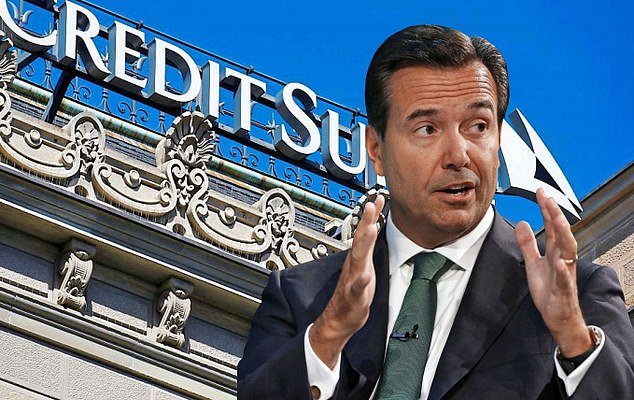Credit Suisse has been thrown into crisis just weeks before Antonio Horta-Osorio joins as chairman from Lloyds Bank.
The Swiss investment bank was already reeling from the aftermath of a spying scandal and its exposure to bust lender Greensill Capital.
But now it has revealed it will suffer a ‘highly significant’ hit to its profits after another client, hedge fund Archegos Capital Management, hit the rocks.
Crisis: Credit Suisse’s new chairman Antonio Horta-Osorio (pictured). The investment bank’s value has fallen by £4.9bn since the start of March
The admission wiped £3.2billion off Credit Suisse’s market value in just one day, as shares fell 13.8 per cent.
Since the stock reached its 2021 peak at the beginning of March, its value has been slashed by £4.9billion.
Horta-Osorio, 57, who has made £60million during his decade at Lloyds, will have a job on his hands as he tries to rebuild Credit Suisse’s fortunes and get the bank back out of the spotlight.
Credit Suisse was one of several prime brokers to Archegos, a hedge fund which invested the wealth of financier Bill Hwang and his family.
Prime brokers lend money to investment firms such as Archegos, allowing them to buy bigger stakes than they could otherwise afford.
This means investors can make bigger returns if their bets are correct – but stand to make painful losses if they are proved wrong, and then have to pay back the loan.
Hwang had placed a big bet on Viacom, the owner of Channel 5 – but it didn’t pay off, as other investors worried that it wouldn’t be able to compete against rivals such as Netflix and Disney Plus.
Prime brokers who worked with Archegos started getting twitchy, and asked the fund to stump up more money to give them more security. But Hwang was left with a problem – he didn’t have enough cash to hand.
In the brokers’ eyes, this meant he was defaulting on the loans they had given him.
They began to sell the shares in Viacom which they held for him, causing their value to tumble further.
Goldman Sachs, Morgan Stanley and UBS – some of the firms which worked as prime brokers for Archego – were quick off the mark and sold the stock to recover the amount they were owed by Hwang.
A source close to Goldman said the impact of Archegos’ crisis on its balance sheet was ‘immaterial’. But Credit Suisse, and Japanese bank Nomura, were slower to sell their positions in Viacom.
Sources close to the Swiss banking titan estimated that its relationship with Hwang could cost £2billion to £3billion in the first quarter of this year.
City insiders said the bank will have questions to answer to its shareholders – and to Horta-Osorio when he begins in April.
One said: ‘It’s not really a question of why firms like Goldman were quick to sell – they should have seen this coming. It’s more a question of why Credit Suisse and Nomura were so slow.’
Another senior City source said: ‘I would love to be a fly on the wall when Antonio has his first conversation with Credit Suisse’s risk department.’
The lender was only just recovering from a spying scandal, which blew apart the staid world of Swiss banking when it emerged in 2019.
A report found that senior individuals within Credit Suisse had put former employees under surveillance, due to paranoia that they would poach top staff.
The affair saw chief executive Tidjane Thiam ousted a year ago, even though an internal investigation found no involvement on his part.
Chairman Urs Rohner, who was caught in a media storm over allegations that his lavish 60th birthday party included a ‘racist’ performance, also agreed to leave this year.
But new boss Thomas Gottstein has so far failed to dodge the skeletons lurking in Credit Suisse’s cupboards.
Just this month, the bank was forced to suspend £7.3billion of funds which invested clients’ money in Greensill loans, after Greensill’s insurer failed to renew its cover.
The firm collapsed into administration, and questions are emerging around whether the assets which Credit Suisse invested in were what investors expected.
Separately Credit Suisse had lent Greensill £100million – which it has admitted it is unlikely to recover.
Some links in this article may be affiliate links. If you click on them we may earn a small commission. That helps us fund This Is Money, and keep it free to use. We do not write articles to promote products. We do not allow any commercial relationship to affect our editorial independence.
